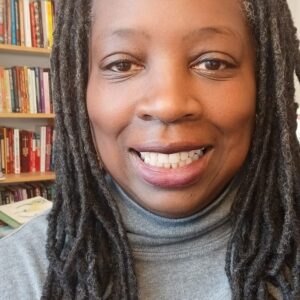The Nineteenth Sunday after Pentecost (Proper 21), September 29, 2024
August 18, 2024 | by Gabrie'l Atichson
| Reading 1 | Reading 2 | Reading 3 | Reading 4 | Reading 1 Alt | Reading 2 Alt |
|---|---|---|---|---|---|
| Esther 7:1-6, 9-10; 9:20-22 |
Courageous Women
Reading the bible through a feminist lens, it is often difficult to find women figures who stand out in ways that are positive. The Book of Esther is the exception.
Theologian, Elizabeth Schüssler Fiorenza, wrote about a hermeneutics of suspicion within Feminist Theology which allows us to think about the social and historical contexts in which sacred texts were written. In that way, we can understand more about what is left unsaid and fill in the gaps about women (some of whom are unnamed) and their lives. The process allows us to use analysis and a little bit of creativity to reimagine texts to empower women – even if that was not the original intention of the writers.
In the Protestant canon, most stories are focused on male figures with women fulfilling invisible service work that is rarely mentioned. Some stories of horrific sexual violence (like that of the Levite’s concubine) are used symbolically or as literary devices. Women are also portrayed as manipulative, cunning, or evil, the story of Eve being the most prominent. These ideas about women are both a result of attitudes about women in the context in which the texts were written and provide a justification for sexism and gender-based violence in contemporary times.
The inclusion of scripture from outside our canon in our lectionary has become important to me. In the Book of Wisdom in particular, Wisdom is most clearly defined as female. In a religious tradition where women are excluded or at least devalued as part of humanity, the personification reframes women’s motivation in stories like that of Eve or Job’s wife as being discerning rather than evil or impulsive.
Like I mentioned earlier, the story of Esther is one in which a woman stands as the hero. Not only does she have a name, but her story has important significance to both Christian and Jewish traditions. We value her service and courage and admire her ability to use her favor as leverage to save her people.
All that said, in the Book of Esther, Esther’s positioning begins in a way that does not feel very feminist. Queen Vashti is summoned by the king and chooses not to obey. As a result, she is removed from her position and a search goes out across the kingdom to find a new queen. Mordecai, a man who is raising his young cousin Esther after her parents have died, decides to place Esther in the competition to be the new queen. Esther is a beautiful young woman and is immediately favored by everyone. Mordecai advises Esther to keep her Jewish heritage a secret for her own safety.
Over time, Esther wins the favor of the king, and is made queen. In the meantime, a man named Haman, who is given a high honor under the king, becomes angry with Mordecai. His anger evolves into a hatred of all Jewish people, and Haman publishes an edict promising to kill all the Jewish people in the kingdom. In a true act of courage, Esther uses her position of favor to approach the king, coming out as Jewish, and advocating on behalf of her people.
In our scripture for the week in Esther 7, Haman is invited to a feast. The king decides to grant his queen a wish. She asks for herself and for her people that he stop Haman’s plan to annihilate the Jewish people. He grants her wish, and Haman ends up meeting the fate Haman had planned for Mordecai.
Purim is the Jewish Festival commemorating the day set aside for the demise of the Jewish people in the Book of Esther, and in celebration of Queen Esther. The festival involves reading the Book of Esther and giving to charity. The story of Esther stands out as one of only a few stories in the Bible where a woman is the central figure and ends up saving the day.
 Gabrie’l J. Atchison earned an M.A. in Religion from Yale Divinity School, and a Ph.D. in Women’s Studies from Clark University. She is an adjunct professor of Gender Studies, a blogger, and an author. Dr. Atchison is the editor of Environment and Religion in Feminist-Womanist, Queer, and Indigenous Perspectives a series by Lexington Books. She is author of Are You The Unchurched?: How to Develop a Relationship with God Inside or Outside of Church and a co-author of More to this Confession: Relational Prison Theology with Chris Barbera. She is a contributor to Preaching the Uncontrolling Love of God, Edited by Jeff Wells, Thomas Jay Oord, et. al. and The Creation Care Bible Challenge, Edited by Marek P. Zabriskie. She lives in Buffalo, New York with her dog, Jack.
Gabrie’l J. Atchison earned an M.A. in Religion from Yale Divinity School, and a Ph.D. in Women’s Studies from Clark University. She is an adjunct professor of Gender Studies, a blogger, and an author. Dr. Atchison is the editor of Environment and Religion in Feminist-Womanist, Queer, and Indigenous Perspectives a series by Lexington Books. She is author of Are You The Unchurched?: How to Develop a Relationship with God Inside or Outside of Church and a co-author of More to this Confession: Relational Prison Theology with Chris Barbera. She is a contributor to Preaching the Uncontrolling Love of God, Edited by Jeff Wells, Thomas Jay Oord, et. al. and The Creation Care Bible Challenge, Edited by Marek P. Zabriskie. She lives in Buffalo, New York with her dog, Jack.
